
Are you looking for great woks to widen your options in the kitchen?
With so many models glutting the market, how do you know which are the best woks and which are a complete waste of money?
Well, you’re in luck. Today, we’ve got a comprehensive buying guide giving you everything you need to get the right cookware.
Before we get started with some background on woks, here’s a glimpse at our overall favorites on our curated shortlist.
I. Our Top Picks for Wok
| Products & Features | Image & Price |
|---|---|
1. Our #1 Pick: Calphalon Contemporary Hard-Anodized Aluminum Nonstick Cookware |  |
2. Best Carbon Steel Wok: Craft Wok Traditional Hand Hammered Carbon Steel Pow Wok |  |
3. Best Cast Iron Wok: Lodge P14W3 Pro-Logic Cast Iron Wok |  |
4. Budget Pick: T-fal A80789 Specialty Nonstick |  |
5. M.V. Trading 14 Inches Carbon Steel Wok |  |
6. TeChef - Art Pan 12" Wok/Stir-Fry Pan |  |
| 7. Mauviel M'Steel Steel Wok |  |
| 8. Chef’s Medal Round Bottom Wok |  |
| 9. Cooks Standard NC-00233 Stainless Steel Stir Fry Pan |  |
| 10. Calphalon Triply Stir Fry Pan |  |
| 11. AmazonBasics Pre-Seasoned Cast Iron Wok Pan |  |
II. History of the Wok
A Wok (Cantonese) is a cooking pan first introduced in China during the Han period, two thousand years ago. It is a versatile round-bottomed cooking vessel often used in various Chinese cooking techniques like steaming, poaching, frying, smoking, boiling, roasting, searing along with many other cooking methods.
A wok is one of the most versatile pieces of cookware, period
Woks are said to derive from the Mandarin words, Guo or Kuo.
These pans are known by different names throughout Southeast Asian Countries:
- Indonesia: penggorengan or wajan
- Malaysia: Kuali and kawa (small and big woks)
- The Philippines: kawali and kawa (small and big woks) in the Philippines,
- Japan: chūkanabe
- India: karahi
Woks usually have a round bottom to simplify the stirring and tossing of food. Hand-hammered woks are made for flipping inside and out in order to make food easier by pushing in the side of the woks.
In Western Countries, woks are designed to have flat bottoms for use on an electric stove use. Different styles for different usage.
Woks are made from many materials including:
- Cast iron
- Carbon steel
- Aluminum
They are manufactured in two main styles: loops and sticks.
Loop handles are made from all types of materials while stick handles are made of steel.
III. What is a Woks Used For?

Woks are useful for far more than whipping up a quick stir fry.
They are also ideal for:
- Steaming
- Boiling
- Poaching
- Searing
- Roasting
- Braising
- Smoking
Imagination is your only limitation when you’re using the best woks.
How about the different types when you’re on the buying trail?
Types of Woks
There are two types of woks:
- Flat-bottomed
- Round-bottomed
Flat-bottomed woks are good for all types of frying. You can also use these wok on gas ranges and electric stoves.
Round-bottomed wok, on the other hand, is useful for cooking up larger batches of food. They boast great heat distribution, and the concave bottoms can also handle larger quantities of boiling water.
Cooking Applications with Woks
Here’s a quick glimpse at some of the different ways you can press woks into commission.
Steaming
Place a steaming basket over boiling water in a wok to make dumplings, siomai, or any other food that needs steaming. Rice and vegetables can also be steamed, as well as some desserts like Leche flan and jelly.
Boiling
Use your woks if you need to boil up some water. You could also simmer some soup.
Poaching and Stewing
Poaching and stewing work well in round-bottomed wok because the concave bottom can easily handle the amount of water needed for this type of cooking.
Searing
You can impart a great sear using a wok. Get your meat, fish, or poultry perfectly browned on the outside and tender on the inside.
Smoking
Woks can be used for smoking, too.
Braising
Food can be sautéed, seared, and braised in a wok. You have so much choice in a single piece of cookware.
Roasting
A large round-bottomed wok is a great piece of kit for roasting up some chestnuts.
Deep-Frying, Pan-Frying, and Stir-Frying
Flat-bottomed woks are the best option for pan and stir-frying.
Choose a round-bottomed woks to deep-fry your food without needing an electric deep-fat fryer.
So far, so good.
What materials work best for woks?
IV. What’s the Best Material For a Wok?

We’ll now look at carbon steel vs. hard-anodized aluminum vs. cast iron vs. stainless steel woks so you can easily compare these various materials like-for-like.
Carbon Steel
Traditional carbon steel woks remain a staple in most Asian households. They are cheap, lightweight, and rugged.
Carbon steel woks heat up quickly and distribute heat evenly. Despite this, they can also withstand high temperatures without releasing toxic substances.
These woks are typically non-stick. Even if they don’t have a non-stick treatment, they are also relatively easy to season. This allows you to cook with less oil or butter, and it also streamlines cleaning.
One downside to carbon steel woks is that they are quite high-maintenance. If you don’t care for it properly, the wok will develop rust, corrode, and break down quickly.
Don’t leave these woks in the dishwasher for too long or it will damage the non-stick coating. You also need to wash and dry the pan after the use.
Carbon steel woks are best for cooking omelets, meats, cakes, bread, and vegetables. Refrain from cooking highly acidic food since this will break down the non-stick barrier.
Hard-Anodized Aluminum
Hard-anodized aluminum is lightweight. The material conducts and transfers heat efficiently making it ideal for cookware and bakeware.
These woks are also durable and scratch-resistant, as well as pocket-friendly.
The low thermal capacity and thin build mean they also lose heat quickly, though.
Cast Iron
Cast iron woks are also preferred by chefs thanks to their first-class heat retention. Once these woks get hot, they stay hot for a considerable length of time. This is perfect when you’re cooking meat or roasting, frying, and baking.
Cast iron woks age like fine wine, getting better over time. Use these versatile woks on any medium from fire pits and stoves to grills and BBQs.
Make no mistake, these woks call for a little maintenance. If neglected, cast-iron woks will rust and crack easily. The heavy and bulky nature also makes them awkward to wash and handle.
Heta distribution is less than ideal, and these woks are prone to cold spots.
Stainless Steel
Stainless steel woks are durable and non-reactive.
They can quickly absorb heat and evenly distribute this heat throughout the pan. All your food will be cooked consistently every time.
Low maintenance and easy to clean, these woks need no seasoning.
Lightweight and easy to maneuver, stainless steel woks are bad heat conductors. Food also sticks easily to these woks.
OK, it’s time for the main event now with our best wok reviews.
V. Top 11 Best Woks
1. Calphalon Contemporary Hard-Anodized Aluminum Nonstick CookwareOur Pick
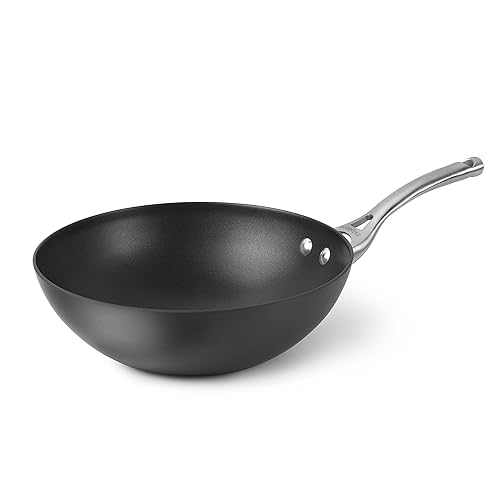
The Caphalon woks are our overall favorite.
Made from durable hard-anodized aluminum, you’ll get consistent heating every time.
The wok is flat-bottomed with a wide cooking surface. This makes the wok ideal for stir-frying on either electric stoves or gas ranges.
The wok also has three layers of nonstick coating for your convenience. It’s dishwasher-safe so you won’t have any messy clean-up either.
The stainless steel handles stay cool. The lid gives you even greater versatility.
Pros
- Durable aluminum build
- Non-stick treatment
- Expansive cooking area
Cons
- Not ideal for large batches of food
2. Best Carbon Steel Woks: Craft Woks Traditional Hand Hammered Carbon Steel Pow Woks

One of the best carbon steel woks at your disposal, this Craft Woks has a round and wide bottom translating into a broad cooking area.
The handle makes maneuvering this thing a snap.
The durable build should return years of faithful service if you don’t abuse it.
Think closely about how you plan to use this woks, though. It’s not induction-ready, and it doesn’t make a good fit for induction stoves either.
When you want the benefits of carbon steel, this is your best bet.
Pros
- 15-gauge carbon steel built to last
- Responsive customer service
- Elegant looking traditional Chinese wok
Cons
- No good for flat electric or induction stoves
3. Best Cast Iron Wok: Lodge P14W3 Pro-Logic Cast Iron Wok

The lodge delivers first-class cookware that doesn’t break the bank, so how does this wok stand out?
Made from heavy-duty cast iron, its lifespan is impressive. This material also retains heat efficiently. Your range of applications extends well beyond stir-frying and sautéing if you invest in this cast iron wok.
The flattened bottom is ideal for most cooking surfaces, including induction. This cookware comes pre-seasoned, too.
For a highly versatile and long-lasting woks from a brand, you can trust, give this Lodge a shot.
Pros
- Durable cast iron build
- Retains heat admirably
- Seasoned cookware
Cons
- Heavy and a little unwieldy
4. Budget Pick: T-fal A80789 Specialty Nonstick

T-fal is a household name famed for its non-stick cookware on a budget.
This wok is dishwasher-safe streamlining cleaning. You can also use it in the oven. It’s safe at temperatures to 350F.
The non-stick surface on the exterior and interior simplifies both cleaning and cooking. Cook with less oil and no mess: what’s not to love.
Pros
- PFOA-Free
- Oven-safe to 350F
- Oversized cooking surface
Cons
- Durability is questionable
5. M.V. Trading 14 Inches Carbon Steel Wok

Another great carbon steel wok is this M.V. Trading woks made from 14-gauge carbon steel. You’ll get a longer lifespan if you look after this pan.
With a flat bottom ideal for electric grills or stovetops, you get a versatile piece of cookware.
The wooden spool handle on the side gives you great maneuverability.
The design lends well to even cooling and heating. Note that you need to season this woks before using it.
Pros
- Durable build
- Flat bottom for flexibility on electric grills and stove
- Affordable without compromising quality
Cons
- Unseasoned heavy carbon steel
6. TeChef – Art Pan 12″ Woks/Stir-Fry Pan
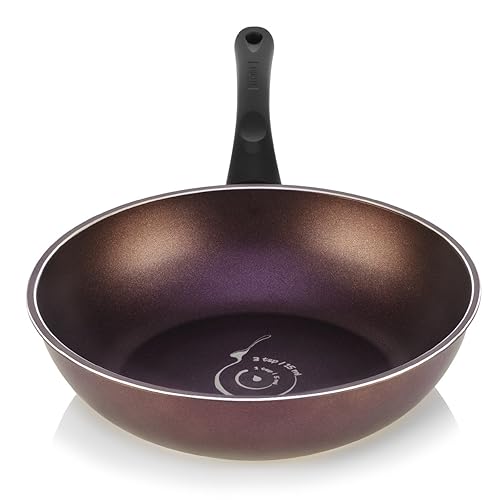
The key selling point of this TECHEF woks is the way it’s coated no less than 5 times coating. You’ll get no PFOA either, so you can cook with a clear conscience.
A unique pattern on the pan helps you to cook with less oil but without your food sticking to the sides.
Oven-safe to 350F, you can whip up a wide range of dishes in a single piece of cookware: what are you waiting for?
7. Mauviel M’Steel Steel Wok

The Mauviel is one of the best steel woks.
Made In France from thick black steel, heat conduction is uppermost. Heavy-duty iron handles complete a robust build that will give you years of faithful service.
The steel can withstand high temperatures allowing you to sear with confidence and to preheat foods for as long as you need.
The Mauviel is good on all types of cooktops, including induction. You can also use metal utensils with no snags.
Pros
- Durable iron handles and steel build
- Can deal with high temperatures
- Great heat conduction
Cons
- Small cooking surface
8. Chef’s Medal Round Bottom Woks
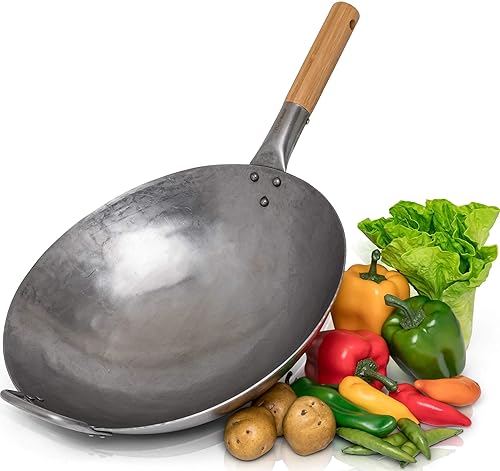
The Chef’s Medal wok is a traditional model in hand-hammered carbon steel.
The curvature of this week gives you the power to stew, steam, boil, and deep-fry like a chef,
The bamboo handle has a hole for ease of hanging or storage.
Heat circulation is superb and there are simple instructions including so you can season this woks. Look after it well and it should last for decades.
Crowned by a lifetime guarantee, you can’t ask for much more.
Pros
- Unbeatable lifespan
- Super-simple to season
- Stellar heat circulation
Cons
- Handle is too short
9. Cooks Standard NC-00233 Stainless Steel Stir Fry Pan
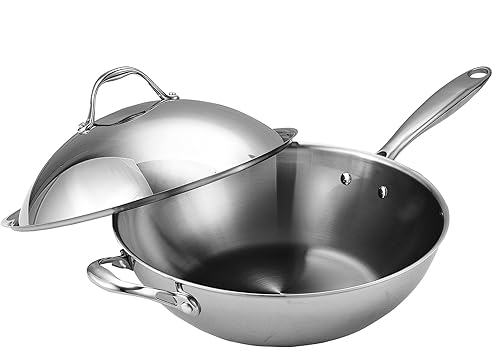
The Cooks Standard fry pan works well for a variety of cooking applications.
The domed lid can help to trap moisture and heat and promote quicker cooking.
The 18/10 stainless steel build and aluminum core give you consistent cooking. The cooking area is expansive at 13 inches, making it perfect for families.
This pan is dishwasher-friendly and oven-safe to 500F.
Pros
- Limited lifetime warranty
- Rust-free stainless steel
- Secure fitting dome lid
Cons
- Denting issues
10. Calphalon Triply Stir Fry Pan

The Calphalon woks with lid offers heavy-duty performance. It’s ideal for stir-frying and much more.
The aluminum core is sandwiched between two layers of stainless steel for even heating with complete control. This pan will help you brown your food to perfection, too.
The clear tempered glass lid lets you check your food while you’re cooking.
With a lifetime warranty, you can buy with total peace of mind.
Pros
- Heavy-duty aluminum core
- Transparent lid
- Safe for all cooking utensils
Cons
- Not the cheapest woks
11. AmazonBasics Pre-Seasoned Cast Iron Woks Pan
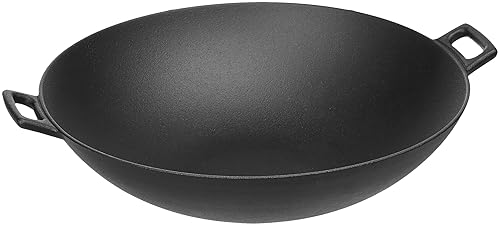
Check out this AmazonBasics cast iron woks pan if you’re looking for reliable cookware on a tight budget.
The cast iron wok is also affordable without compromising quality. It’s also versatile and useful for multiple cooking applications.
The loop handles on the side make cooking with this pan a cakewalk.
Pros
- Pre-seasoned woks
- Also works well for roasting and baking
- Two loop side handles for a secure grip
Cons
- Rusting issues
VI. What to Look for in a Wok
Now you’ve seen some of the best woks on the market, what should you look for when you’re buying one?
We’ll walk you through that right now.
First, focus on the type of woks you want.
Type of Woks
There are various types of wok from the traditional carbon steel type to woks made from aluminum and stainless steel.
Each type has its advantages and disadvantages and there’s no right or wrong choice.
Ultimately, though, little can beat a good old carbon-steel woks. Inexpensive, these woks conduct heat evenly and boast a natural non-stick finish.
Non-stick properties
The non-stick property of a wok is something else to consider
You can cook with less oil or butter, and you won’t get food smeared all over the sides.
Make sure you check user reviews to establish there’s no reported issue with the non-stick coating degrading and flaking off over time.
Flat-Bottomed or Round-Bottomed?
Woks can have a flat or round bottom.
Those with a flat base work on more cooking surfaces from gas and electric stoves right through to induction stovetops.
Size and Lightweight Construction
Size matters when choosing a wok.
You should look for the ideal balance between maneuverability and durability while making sure you have sufficient cooking surfaces to prepare the meals you need.
Handles
Look for a wok with cool-touch handles so you can cook with more confidence and enjoy greater maneuverability.
Woks with Lids
Lids are also important in choosing a wok and generally for cooking. will make it easier for you in cooking foods because most often than not, in the cooking process, ingredients need to simmer and be covered. Lids also help cook the food faster, evenly and help the keep in flavors.
Price
In buying a wok, it is also important to look out for the price. There are many different types and designs of woks out in the market today. You can choose them according to your preference and your cooking needs. But never forget to compare the price point. There are many wonderful choices available; you can get a well-made and high-quality wok at a relatively lower price.
Warranty
It is also important to look for a product with a good warranty. Warranties can be your lifesaver when you have problems or you are not satisfied with the woks you purchased. A good warranty will help you get the best out of the money you paid for the product.
The abovementioned things are just some of the few things you have to look for in choosing a wok. Ultimately, your choice will still depend on your preference. Choose one that is suitable for your needs, home, and one that fits your budget.
VII. How to season a wok
A wok is very important to Asian cooking. It cooks the ingredients perfectly and it has a unique shape that makes it the perfect kitchen equipment for tossing motion that is needed in cooking stir-fried meals.
Purchasing the right kind of wok can be intimidating because they come in different shapes and different materials are available in the market. Getting the right wok for you depends on your personal preference.
Once you get the wok that you need, you need to season it. With proper care, a natural patina will develop over the surface every time, making it nonstick. Here are the steps on how to season a wok:
Scrub off the oil
Woks that are made from carbon steel have a layer of factory oil around their walls. They do this to keep the steel from rusting and to keep them looking brand new, at least while they are still in the market. You must remove the layer of oil before you use the wok as it could get mixed up in your food.
To scrub the oil off, you need a metal scrubber and a dish soap. You only use abrasive scrubbers and soap when you are preparing the wok for seasoning. Do not use them for maintenance and regular cleaning as you will remove the patina and it will ruin the nonstick surface of the wok.
Dry the Wok
Place the cleaned wok on your stove over high heat. You do not have to pat your wok dry with a towel. The water will evaporate when it is placed on a stove over high heat. Once it is clean and dry, you can wet your hand and flick some water onto the wok. If it sizzles and evaporates after a few seconds, the wok is ready.
Season the Wok
The goal of this process is to open the small holes of your wok so it can absorb the oil that you placed to prevent damage and rusting and to start having a nonstick surface. It is best to turn your exhaust fan before you start this set.
Put 2 tablespoons of high heat oil or peanut oil into your wok. Reduce the heat of the stove to medium. You can then add the sliced ginger, garlic, and scallions to the wok. Stir fry the vegetables and use the back of a spatula that is made for woks to press the vegetables against the sides and walls of your wok. It can help spread the oil around the wok evenly.
Do it for a couple of minutes, as the wok needs time to develop a patina. Your vegetables will look a bit burned by the end of the step but that is normal.
Some woks will undergo so much change in color once it is heated for a long time, they usually go from grey to blue. It is perfectly normal. After a couple of minutes, you can turn off your stove. Let your wok dry up and cool down for a bit before you remove the vegetables and throw them away.
Dry your wok and seal it with oil
Heat your wok again by using high heat. Once the water evaporates, you can turn off the heat. Rub a thin layer of oil into your wok carefully. You can pour 1 to 1 1/2 teaspoon of oil into your wok and run it throughout the wok with layers of paper towels.
If you spot bits of food stuck to the bottom of the wok, you can fill your wok with 5 cups of water. Boil the water and drain it. The boiling water should be able to separate the bits of food from the wok and loosen it so it will be easier to remove with a sponge. After you clean your wok, you can dry it over high heat and rub oil on the inside.
To take care of your wok and make sure that it will last long, you can scrub the first signs of rust with a scouring pad. Rinse your wok and season it again.
VIII. Conclusion
Well, if you started out today with no idea about the best woks, you should now have a much firmer idea.
Stick to any of the models we review today and you’re in safe hands. If you opt for a wok, not on our shortlist, pay attention to the tips in our buying guide and you should find a suitable pan with ease.
Bookmark Foodie&Tours before you go and come back soon!




Pingback:How To Cook With A Wok Guide To Learn How to Cook Dishes You Like - Foodie&Tours